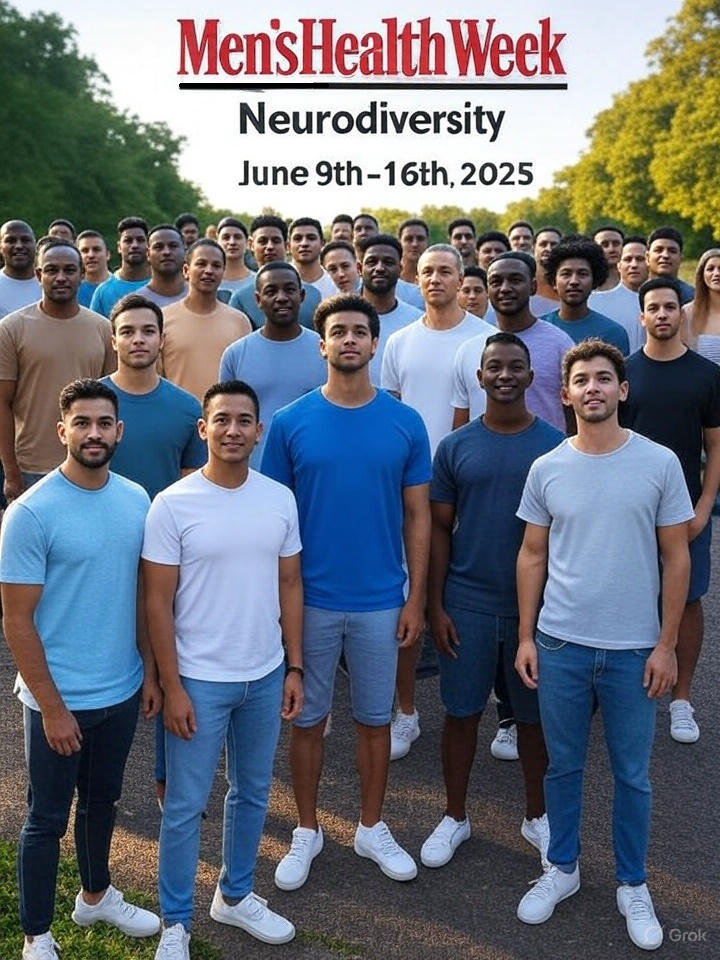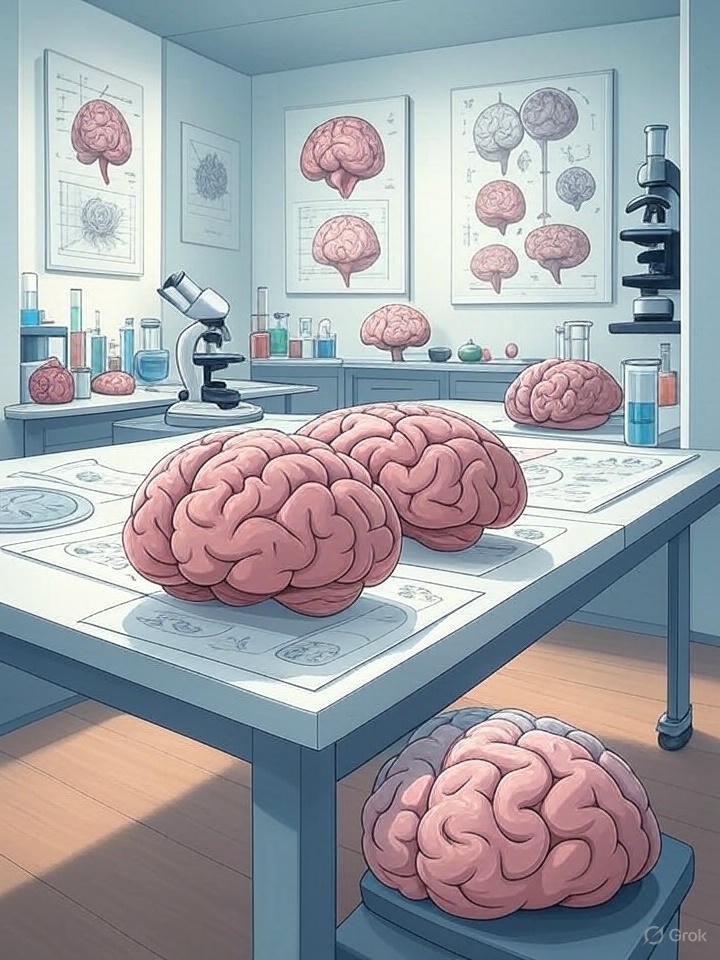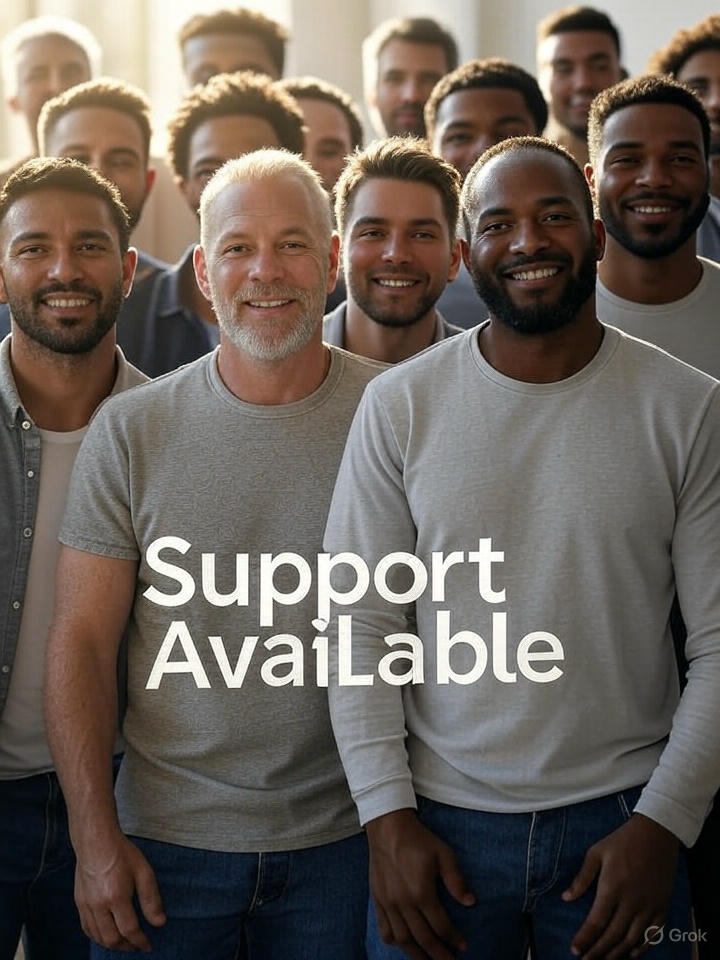
Men’s Health week is nearly here (9th-16th June 2025), so I’ve looked at how neurodiversity and men’s mental health connect in fascinating and sometimes challenging ways. Neurodiversity is all about recognising that brains work differently for some people—think Autism, ADHD, or Dyslexia. These aren’t problems to fix; they’re just unique ways of thinking and seeing the world. When we talk about men’s mental health, we’re focusing on the emotional well-being of guys, which can be shaped by these differences.
Why does this matter? Well, understanding this connection helps us celebrate the amazing strengths neurodivergent men bring, like creativity and problem-solving. It also shines a light on the challenges they face, like social struggles or higher risks of anxiety and depression. Plus, society’s expectations—like the idea that men should always be tough—can make things trickier. Let’s dive into what makes this topic so important and how we can support neurodivergent men better.
What is Neurodiversity?
Neurodiversity covers a range of conditions that affect how people process information and interact with the world. Here’s a quick look at some common ones:
- Autism Spectrum Disorder (ASD): People with autism might find social interactions tricky or prefer routines, but they often have incredible focus and unique perspectives. Think of someone who notices details others miss!
- Attention Deficit Hyperactivity Disorder (ADHD): ADHD can mean trouble focusing or sitting still, but it also brings bursts of creativity and energy that can lead to out-of-the-box ideas.
- Dyslexia: This affects reading and writing, but many with dyslexia excel at problem-solving and thinking creatively.
These differences aren’t deficits—they’re just part of the human experience. Recognising this helps us build a world where everyone feels valued.
The Bright Side: Positive Impacts of Neurodiversity

Neurodivergent men often have superpowers (this is a loved/hated phrase) that shine in the right environment. Their unique ways of thinking can lead to amazing things:
- Creativity and Innovation: Neurodivergent people often see connections others don’t. This has led to breakthroughs in science, tech, and art. For example, Albert Einstein, believed to be on the autism spectrum, changed physics with his theory of relativity. Similarly, Bill Gates, who has dyslexia, co-founded Microsoft and reshaped technology.
- Attention to Detail: Many neurodivergent men, especially those with autism, have a knack for spotting tiny details, making them great in fields like engineering or design.
- Resilience: Navigating a world not always built for them can make neurodivergent men incredibly adaptable and strong.
These strengths can boost mental health by giving a sense of purpose and pride.
Social Challenges for Neurodivergent Men
While neurodiversity brings strengths, it can also make social situations tough. Many neurodivergent men struggle with things like reading social cues, maintaining eye contact, or picking up on unspoken rules in conversations. For example:
- Autism: Someone with autism might find small talk confusing or overwhelming, which can lead to feeling left out .
- ADHD: Men with ADHD might seem distracted in conversations, which others might misread as not caring.
These challenges can lead to isolation, which is tough on mental health. Studies, like one from Molecular Autism, show that autistic individuals often face higher rates of anxiety and depression. The pressure to “fit in” can make things even harder, especially when society expects men to hide their struggles.
Societal Expectations and Their Impact
Society often has rigid ideas about what it means to be a man—think “tough,” “independent,” or “never show weakness.” These expectations can hit neurodivergent men hard:

- Emotional Stoicism: Men are often told to bottle up emotions, which can make it tough to express anxiety or sadness.
- Self-Reliance: Asking for help is sometimes seen as weak, so many neurodivergent men suffer in silence.
- Pressure to Succeed: Society often measures men by their achievements, which can feel overwhelming for those facing extra challenges due to neurodivergence.
The American Psychological Association notes that these norms can increase stress and mental health risks. For neurodivergent men, who may already feel different, this pressure can lead to internalised struggles and a higher chance of depression or anxiety.
Moving Forward: Support and Solutions
So, how can we help neurodivergent men thrive? Here are some ideas:
- Raise Awareness: Let’s educate everyone about neurodiversity and its impact on mental health. Understanding reduces stigma.
- Promote Inclusivity: Create spaces—workplaces, schools, communities—that welcome neurodivergent people.
- Challenge Masculinity Norms: Encourage men to talk about their feelings and seek help without shame.
- Tailored Support: Offer mental health resources that understand neurodiversity and intersectionality.
Self-care is also key. Simple practices like deep breathing, exercise, or creative hobbies can make a big difference. Connecting with supportive friends or groups can ease feelings of isolation.
Resources for Support
If you or someone you know needs help, here are some great places to start:

- National Suicide Prevention Lifeline: Call 800-273-TALK (8255) for 24/7 support .
- Crisis Text Line: Text NAMI to 741-741 for free, 24/7 crisis support.
- Neurodiversity Network: Offers resources for neurodivergent individuals .
- Change Mental Health: Provides guidance for neurodiverse people .
- Mind: Shares info on autism and mental health .
Professional help from therapists who understand neurodiversity can also be a game-changer.
Wrapping Up
Neurodiversity brings incredible strengths to men’s lives, from creative breakthroughs to unique perspectives. But it also comes with challenges, especially when societal pressures and intersectional identities come into play. By raising awareness, challenging outdated norms, and providing tailored support, we can help neurodivergent men not just cope but thrive. Let’s build a world where everyone’s brain is celebrated, and mental health is a priority for all.
References
Here’s where I got my info:
| Source | Description |
| American Psychiatric Association | Diagnostic and Statistical Manual of Mental Disorders (5th ed., 2013). |
| Cassidy et al., 2018 | Study on risk markers for suicidality in autistic adults. |
| Lai et al., 2014 | Comprehensive overview of autism in The Lancet. |
| Ruzich et al., 2015 | Review of autistic traits in the general population. |
| World Health Organisation | Global health estimates on depression and mental disorders (2020). |
And Finally…
If you have any comments on any part of this, advice / suggestions or questions that I may be able to assist you with, please feel free to contact me at pe**@***************se.com or add a comment below and I will get back to you as soon as I can 😊
Thank you & take care,
Pete
Key Citations:
- Autism Speaks – What is Autism
- CDC – ADHD Information
- Dyslexia.com – Understanding Dyslexia
- Autism.org.uk – Autistic Strengths and Challenges
- Dyslexia.com – Bill Gates
- NCBI – Social Interaction in Autism
- APA – Masculinity and Mental Health
- Molecular Autism – Suicidality in Autistic Adults
- Autism – Neurodiversity and Minority Status
- 988 Lifeline – National Suicide Prevention
- Neurodiversity Network – Resources
- Change Mental Health – Supporting Neurodiverse People
- Mind – Autism and Mental Health
- Frontiers in Psychology – Neurodivergence and Mental Health
- ScienceDaily – New Framework for Neurodiversity
- American Psychiatric Association – DSM-5
- The Lancet – Autism Overview
- WHO – Depression and Mental Disorders

